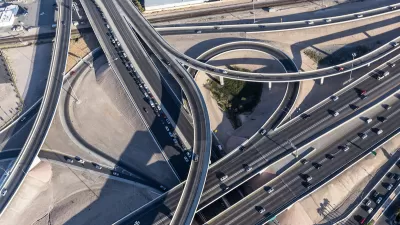The Economist looks at the looming battle between Congress and the Administration over whether to proceed now on transportation reauthorization or delay it 18 months, and concludes that the bottom line will be the funding mechanism.
Despite differences between House Committee on Transportation and Infrastructure Chair James Oberstar and DOT Secretary LaHood, there is hope that the new bill will be an improvement over the current one. Key, though, will be how to pay for it. Agreeing how to fill the broke Highway Trust Fund is central to the bill.
"Now a strategy is emerging at last. Mr. Oberstar would spend $450 billion on roads, bridges and mass transport, 38% above current levels, and devote $50 billion to high-speed rail.
Such ambitious plans, however, may have to be postponed. Mr. LaHood wants to extend the old transport bill by 18 months. Even without a new bill, there may be room for progress, says a hopeful James Corless of Transportation for America, a reform group. The transport secretary says he would send more money to metropolitan areas and use cost-benefit analyses to guide investment. The DoT is already encouraging plans to build housing near transport, expand access to buses, subways and bicycles, and reduce emissions in the process.
Still, a main question remains unanswered. The Highway Trust Fund will soon be empty. There is no consensus on how to fill it. The gas (petrol) tax, the main source of revenue for transport, has remained flat since 1993. Revenues have declined as travel has ebbed in the recession and cars have become more efficient. In the long term, congestion pricing is the best solution, but it could take years to adopt. In the meantime the Obama administration is loth to raise the gas tax. Siphoning money from general funds is an easy but unsustainable answer. There may be a new vision for transport, but it will never progress until someone is willing to pay for it."
Thanks to Bay Area Transportation News
FULL STORY: Ambitious plans for American transport run into reality

Planetizen Federal Action Tracker
A weekly monitor of how Trump’s orders and actions are impacting planners and planning in America.

San Francisco's School District Spent $105M To Build Affordable Housing for Teachers — And That's Just the Beginning
SFUSD joins a growing list of school districts using their land holdings to address housing affordability challenges faced by their own employees.

The Tiny, Adorable $7,000 Car Turning Japan Onto EVs
The single seat Mibot charges from a regular plug as quickly as an iPad, and is about half the price of an average EV.

Austin's First Single Stair Apartment Building is Officially Underway
Eliminating the requirement for two staircases in multi-story residential buildings lets developers use smaller lots and more flexible designs to create denser housing.

Atlanta Bus System Redesign Will Nearly Triple Access
MARTA's Next Gen Bus Network will retool over 100 bus routes, expand frequent service.

Toronto Condo Sales Drop 75%
In two of Canada’s most expensive cities, more condos were built than ever — and sales are plummeting.
Urban Design for Planners 1: Software Tools
This six-course series explores essential urban design concepts using open source software and equips planners with the tools they need to participate fully in the urban design process.
Planning for Universal Design
Learn the tools for implementing Universal Design in planning regulations.
Smith Gee Studio
City of Charlotte
City of Camden Redevelopment Agency
City of Astoria
Transportation Research & Education Center (TREC) at Portland State University
US High Speed Rail Association
City of Camden Redevelopment Agency
Municipality of Princeton (NJ)





























